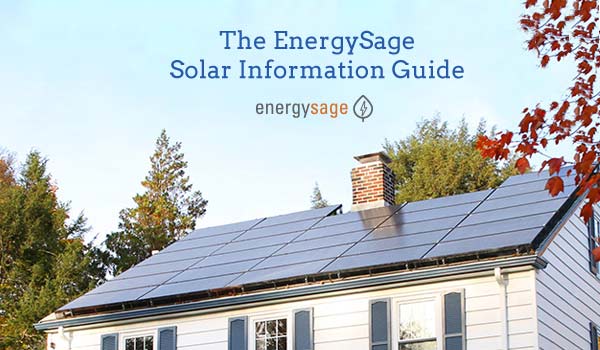
When it comes to big ticket purchases, a solar panel installation is one of the most complex. The benefits of solar energy are fairly simple: you’ll significantly reduce your energy expenses while also upgrading from fossil fuels to a clean renewable solution. However, it’s important to maximize your potential savings and system output with solar. In order to do so, there’s a vast amount of information that you need to understand. This article will give you a holistic view on all the solar panel information you should get before signing the dotted line with a solar contractor.
Cost, financing, equipment and incentive information about solar energy
What will solar panels cost?
The cost of solar has dramatically dropped in the past decade, leading to a lot of questions about how much you should expect to pay for a solar panel installation. The first thing you’ll want to do is find out what solar prices are like in the U.S. That can give you general guidance, but to get a better idea for your home, look at what it costs to go solar in your specific state or neighborhood – local incentives in your area are a big determining factor for what you end up paying. You’ll also want to consider your electricity costs in order to estimate how much money you’ll be saving with solar and how soon your system will pay for itself. Check out some of these key resources:
- What do solar panels cost in 2018?
- Are electricity prices going up or down?
- How much money can solar panels save?
- How do I calculate my break-even point for solar?
- Personalized solar calculator
How should you finance your solar panels?
The topic of financing is particularly important to research when it comes to solar. There are significant differences in net cost and long-term savings from solar depending on how you choose to pay for the system.
Simply put, you can either purchase your system outright or use a third party option to finance it (using a lease or PPA), and there are pros and cons to both options. The simple impact is that the majority of all solar deductions, rebates and incentives will only apply to homeowners who purchased their solar system – third party buyers will not qualify. Here are some helpful articles that will take you through the ins and outs of solar panel financing:
- Should you buy or lease your solar panels?
- How do solar leases and solar PPAs compare?
- Which companies provide solar loans in my state?
What incentives and tax credits are available for those considering solar?
Solar is the cheapest energy source in the world thanks to silicon efficiency innovations, and the U.S. has a long list of additional solar incentives and tax breaks that make solar even more attractive to homeowners. From net metering to the federal tax credit for solar, there are a plethora of ways to reduce the price of a PV system for your home or business. Check out our top three list of rebates and incentives that are offered across the country:
What solar equipment will I need to research?
Though the primary equipment for your solar installation will be the panels themselves, there are a number of other necessary parts needed to have a complete PV system. From the required equipment like inverters and racking to the add-on considerations like tracking mounts and monitoring systems, there will be a hefty list of equipment decisions to make in order to get the best system for your home. Here are the questions you’ll want to answer:
- What solar equipment do I need to go solar?
- What is the difference between polycrystalline and mono crystalline solar panels?
- How should I compare different inverter options for solar?
What are the best brands in solar for equipment, installers and financing?
After you’ve figured out what types of equipment you’ll want to purchase in terms of the technology and functionality, the next step will be to weigh the many brands in solar and determine what will fit your needs the best. Whether you’re comparing solar panels, inverters or even the installer that will build your system, there will be hundreds of different companies to compare and contrast with different factors to consider.
For example, some solar panels are much more efficient than others, but they’ll cost more money up front. Some installers may have better workmanship warranties but may not offer all financing packages. Ultimately, you’ll want to look at aggregate lists of the best brands for different areas of solar shopping to determine which companies are best for different types of buyers. Here are some of our recommendations:
- What are the best solar panels on the market?
- What are the top residential solar installers in 2017?
- What are the best solar panel manufacturers?
Even with all of this solar information, how should I shop for solar?
Though you will certainly benefit from doing your research, simply being educated about solar will not guarantee you the best price on your home solar system. You probably have already heard the mantra: the more options you have, the more money you’ll save. This concept most definitely applies to the solar industry – solar quotes can vary significantly, and potential savings for homeowners can differ by thousands of dollars. With a bid-comparison platform like EnergySage, you can receive quotes from multiple, pre-screened installers that serve your area (even as local as your specific town).
On EnergySage you can get solar quotes from as many as seven different installers and compare options side by side in terms of overall cost, incentives, long term savings breakdowns and more. Homeowners who use EnergySage save $3,000 to $5,000 on average thanks to the nature of multiple companies competing for your business. To start receiving free solar bids from local solar companies, check out the EnergySage Solar Marketplace. If you are just seeking an estimate for what solar would cost you, try our Solar Calculator.
 Facebook
Facebook
 X
X
 Pinterest
Pinterest
 Copy Link
Copy Link



